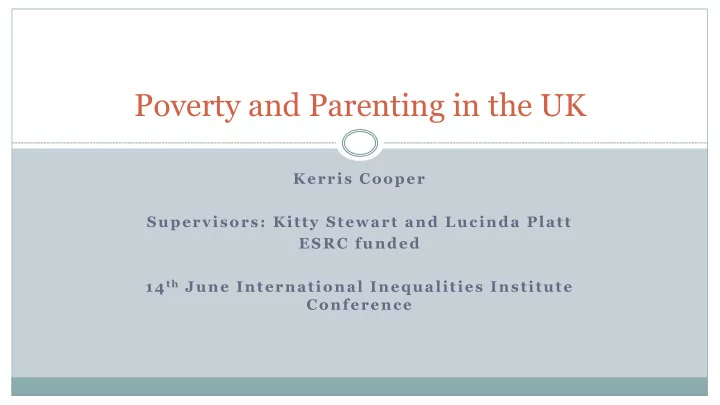

Poverty and Parenting in the UK Kerris Cooper Supervisors: Kitty Stewart and Lucinda Platt ESRC funded 14 th June International Inequalities Institute Conference
Background and Motivation By the time children start school there is already an achievement gap between richer and poorer students One explanation for this is differences in parenting This has been the main policy focus in the UK – parenting rather than poverty (e.g. Field report, 2010) But the two are very much connected Parenting US causal evidence (Cooper & Stewart, 2013) Child UK evidence parenting explains 50% of the ? outcomes relationship (Kiernan & Huerta, 2008; Poverty Mensah & Kiernan, 2011)
Background and Motivation Research questions: What is the relationship between economic hardship* and parenting 1. in the UK? 2. What mechanisms explain this relationship? UK context: Parenting Increased focus on parenting policy Child Cuts to benefits ? outcomes Redefining child poverty Poverty Increase in child poverty
Data Using the Millennium Cohort Study (MCS) Oversampled areas with high poverty Cross-sectional analysis : wave 3 when child aged around 5 years Mothers only Taking into account: mothers’ education, work status, age, ethnicity, number of siblings, one/two parents N= 14,376
Measuring parenting Conceptual framework 1. Meeting physical needs 2. Parent-child relationship • E.g. Nutrition, physical • How close feel to child activities 3. Discipline and control 4. Cognitive stimulation Authoritative discipline Trips out • • Harsh or permissive Hours of TV & computer • • discipline Play activities • Routine Involvement in education • • Rich dataset: use 38 measures of parenting. N.B. All self-reported
1. Are poor parents poor parents? Looking across the full income distribution (rather than binary poverty measure) Specifically comparing mothers in the lowest income group and mothers with median incomes
Findings – Are poor parents poor parents? Parenting measures where low income parents do better 0.4 0.35 Probability of 'ideal' parenting 0.3 0.25 0.2 0.15 0.1 0.05 0 take to park physical activities together help with writing help with maths low income average income
Findings – Are poor parents poor parents? .1 .2 .3 .4 .5 .6 Parenting measures where low income parents are doing worse 0 -.6 -.5 -.4 -.3 -.2 -.1 lowest 2nd 3rd 4th highest income group Trips out Physical needs TV hours Routine
2. What mechanisms explain this relationship? US evidence for the Family Stress Model (Conger et al, 2000) Is this model relevant for the UK? Do the pathways differ in relation to different parenting behaviours?
Findings – What mechanisms explain this relationship? Partially mediated: • Meeting the child’s physical needs (21%) • Routine meal and bedtimes (34%) • Educational activities (37%)
Findings – What mechanisms explain this relationship? Fully mediated: • Closeness to the child Authoritative discipline • • Harsh/permissive discipline • Play activities
Findings – What mechanisms explain this relationship? No mediation: • Trips outside of the home • Hours of TV and computer games
Summary of findings Not straightforwardly the case that poor parents are poor parents – some parenting behaviours where low income mothers doing better Where there are negative differences many of these differences are not specific to low income parents but part of a broader income-parenting gradient The negative relationship between hardship and mother’s mental health explains this relationship for most parenting behaviours
Implications for policy No magic bullet in parenting classes Importance of economic context in which parenting takes place – protecting family incomes (but also improving housing, local areas, tackling problem debt) Significant role of mother’s mental health – another important area for policy intervention, though again influenced by economic context
Thank you for listening Email: k.m.cooper@lse.ac.uk Twitter: @CooperKerris
Motivation Explaining the gap between richer/poorer children Policy focus on parenting rather than poverty e.g. Field Report (2010) Poor parents blamed and structural constraints ignored (Gillies, 2007) But Dermott (2012): ‘a false dichotomy’ Current context: Cuts to tax credits & benefits which will affect families with children most (IFS, 2015) Increase in child poverty: +200,000 by 2016 (Resolution Foundation, 2015) Redefining poverty – focus on employment/education
Contributions Include measures of parenting across multiple domains 1. 2. Not just focusing on binary poverty - examines differences in parenting across the income distribution Multiple measures of economic hardship 3. 4. Test whether the Family Stress Model mechanisms are relevant to the UK
Findings 2 – debt, deprivation and feeling poor OECD equivalised income quintile Sample Hardship measure: lowest 2nd 3rd 4th highest Total size Debt 47.7 30.1 12.8 5.7 3.8 100 14287 Material deprivation 51.9 27.1 13.3 6.1 1.6 100 14303 Subjective hardship 45.5 24.9 16.9 9.6 3.1 100 14304 Crowded housing 43.9 31.4 14.1 6.9 3.6 100 14308 Damp housing 40.0 27.0 15.7 9.1 8.3 100 14305 Poor/unsafe area 43.9 30.9 13.1 7.8 4.4 100 14292 Negative area observation 47.7 27.7 14.5 6.7 3.3 100 11362 Worst decile Index of Multiple Deprivation 51.7 29.5 11.1 5.0 2.7 100 8970
Findings 2 – debt, deprivation and feeling poor Physical Harsh or Play Educational TV/PC Hardship measures needs Closeness Authoritative permissive Routine Trips out activities activities hours Confidence Lowest vs median income worse n/s worse better worse worse n/s n/s worse n/s Persistent poverty worse worse worse n/s worse worse n/s worse worse n/s Debt worse n/s better worse worse worse worse worse worse worse Material deprivation worse worse better worse worse worse worse worse worse worse Subjective hardship worse n/s better worse worse worse worse worse n/s worse Crowded n/s worse worse n/s n/s worse n/s n/s worse worse Damp worse worse n/s worse worse worse worse n/s worse worse Poor/unsafe area worse n/s n/s worse worse worse worse worse worse worse Negative area observation worse n/s n/s n/s worse worse n/s n/s worse worse IMD worst decile worse n/s n/s n/s worse n/s worse n/s worse n/s
Recommend
More recommend